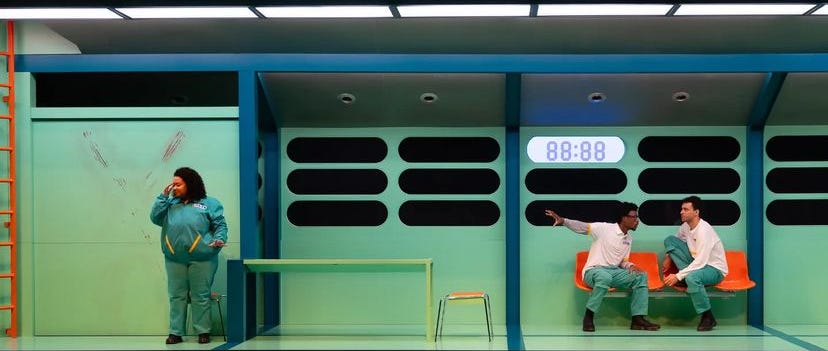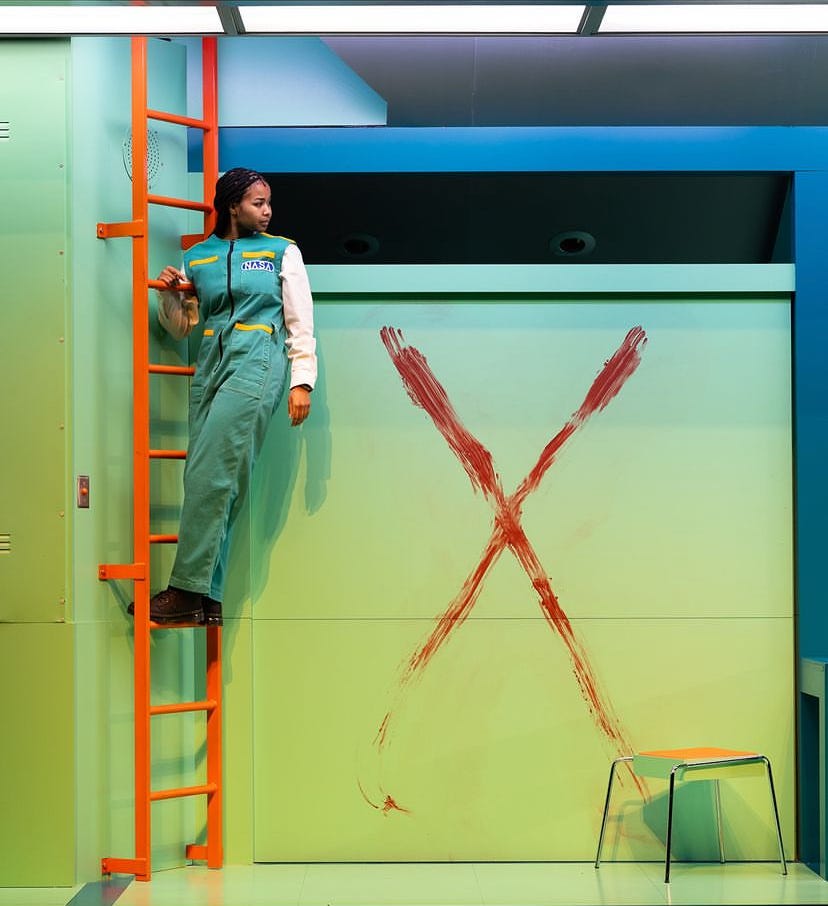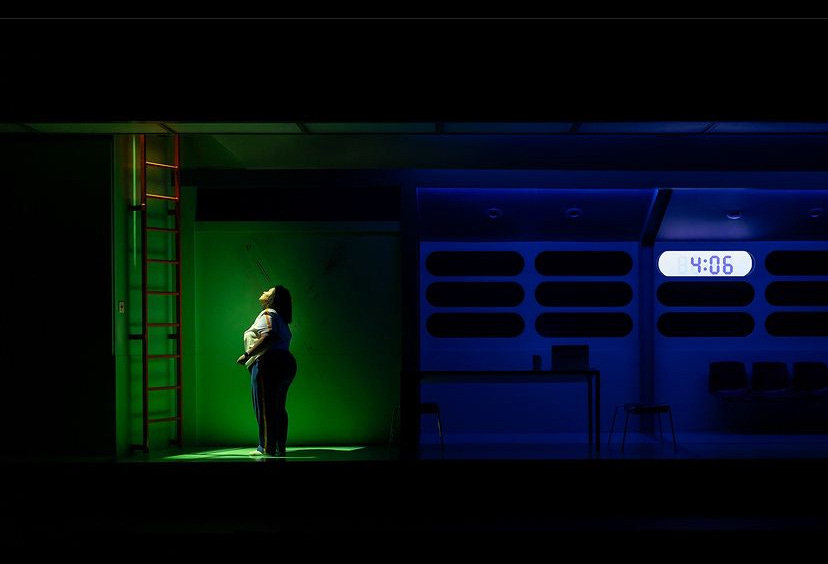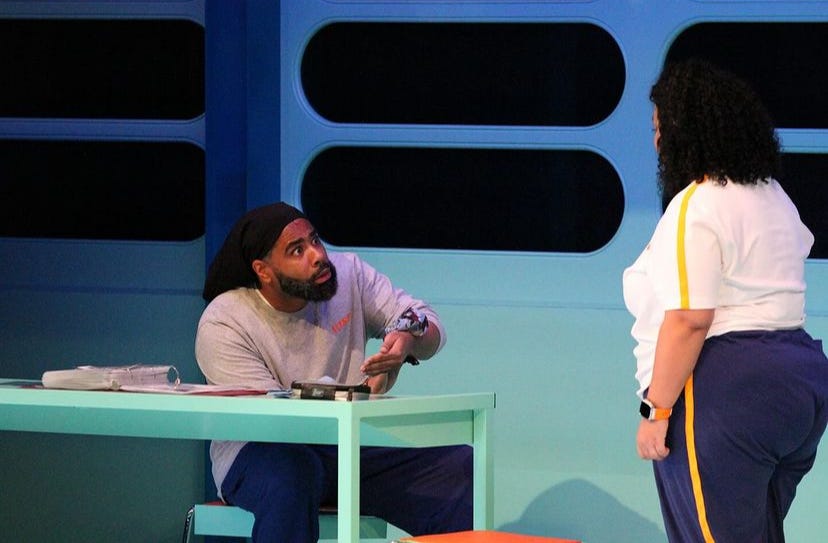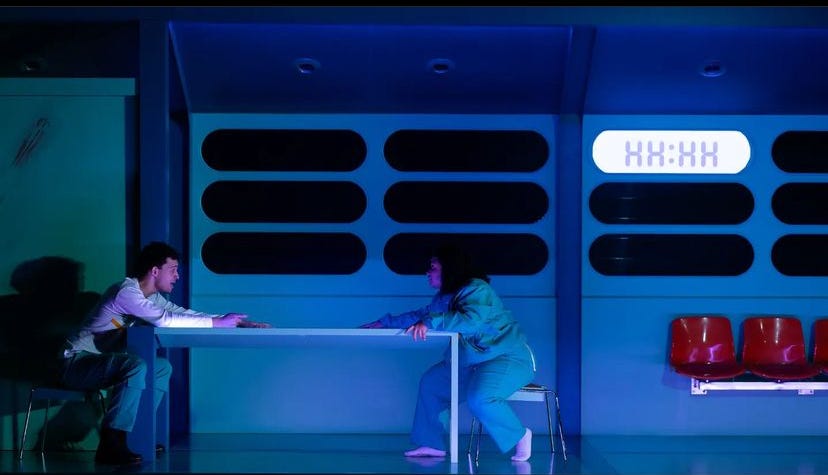All of Everything
X
Time for your periodical reminder that I am a theater student.
Just like what I wrote at this time last year, this is going to be a less conventional issue. A couple weeks after my 20th birthday I touched on Journey and why it’s so important to me, and I fully expected to do so again now (a couple weeks after my 21st.) However, I got to see something I had been looking forward to for several months: X by Alistair McDowall, the master’s thesis of visionary director Rosie Glen-Lambert. It was the best play I have ever seen, and I decided it would be a disservice to not write about it at length. There’ll be a lot to unpack (spoilers included,) and I don’t know how well this will read for a person who didn’t see the play, but I hope you’ll enjoy!
Five astronauts in a not-too-distant future were sent on a mission to Pluto after Earth was rendered uninhabitable and devoid of life. In the darkness they occupy billions of miles from the sun, they begin to lose their grip on their humanity and grapple with the merciless forward march of time itself.
(all photos by Rich Soublet)
Glen-Lambert’s production highlights distance and takes it a few steps further than just the fact that the crew is so far away from Earth. My favorite examples are between the actors both physically and emotionally. This is one of the only plays I’ve seen where I’ve found a great deal of storytelling in the blocking. More often than not, the most vulnerable, intimate moments of the play are the only ones in which characters share physical contact. Clark’s death jumps out at me in particular. His unrelentingly abrasive personality creates such gaps between him and the rest of the crew for so long— regularly insulting and belittling those around him and refusing to wear clothes when we first meet him— yet his final minutes are spent cradled in Gilda’s arms. He and Gilda lose themselves and find each other again countless times before his life ends, and I found it rather poignant to think that in a lifetime in which one cannot even remember their name, something transcendent continues to pull the two of them together over and over. Not even in a soulmate kind of way. In the way of needing love and compassion on a primal, survivalist level.
On a similar note, Gilda’s hallucination of Mattie (Kennedy Tolson) as an astronaut rescuing the crew is abruptly ended when she reaches out to touch her face, and the scene resumes with her trying to explain this interaction to a judgmental Cole (Jalen Myles Davidson) and a confused Clark (Elliot Sagay.) Something my girlfriend deftly noticed is that Mattie’s job in the station is to maintain the oxygen and water systems, the two barest of necessities, and Gilda confesses much later in the show that she wanted to have a daughter so that she wouldn’t be alone. Coupled with the way that the first scene change is triggered at the top of act two, Gilda’s emotional distance from the other three astronauts only heightens the stakes surrounding Mattie, who represents her idea of what will save her from the horrors of the cosmos.
The soul of the crew is Gilda (Kat Peña.) Beginning as a geologist trying to get by as a member of this team, she ends up an acting captain faced with the cruelest fate of anyone in the play: living the longest. Peña’s performance was grippingly dynamic and remarkably urgent. The play’s narrative stems entirely from her point of view, and even though it’s structured to frame her as something of an unreliable narrator, there was never a moment that I stopped believing her. She is the only character trying to expand her role onboard the station, and even though the other members put her down cruelly and relentlessly, there’s always a spark of fight in Peña’s eyes.
Life, living, and being alive are three concepts that take a turn in the spotlight during X’s runtime. And the character that brings out this side of the crew the most is Ray (Kenneth J. Ray,) an older man who notably is the only character who was alive on Earth when animals were too. Ray’s performance was rooted in wanting to be believed and empathized with, and these foundational elements were gripping to watch when applied to each of his scenes in the first act. I was deeply affected by his attachment to a collection of strangers’ photographs that he clung to just because they represented a life that once was. And then, as he was on the brink of suicide, the last thing to put a smile on his face was hearing the chirps of his favorite nightingale. Ray (the actor) found remarkable truth in this role and I was enraptured by him in his half of the first act.
In conversation with him, Ray shared with me that he feels some of that truth stems from how we in the real world are living in “the before,” which his character was the only one of the five to witness firsthand. He admits to Clark that the thing he misses most about the world is real homemade food, and his presentation of the idea of eating a burger that wasn’t cultivated in a Petri dish is a humbling, perspective-shifting wish. X holds up a mirror to us as audience members who still live in a world that can be saved, and encourages us to look at the climate crisis with a more critical lens.
Each of the five characters informs the mannerisms of the others since they have only seen one another for the indefinite period of time their mission has spanned. They all know so much about each other, whether that’s willingly through sharing stories and keepsakes or unwillingly through out-of-touch behaviors like Clark refusing to wear more than just his boxers, and the team also imparts certain fears or thoughts to one another. Something textual that I picked up on was while telling Clark about how he prefers the grim reality of being trapped in space, Ray tells him that he is “not going to sputter out in [his] apartment where no one finds [him]” and “wait for the worms to eat [him] away” (41) and this phrasing returns later in Clark’s final moments. In his desperation, he tells Gilda that he is “sputtering out” and that his “body's catching up with [his] brain” (153.) While Ray uses this sentiment as a self-empowered reclaiming of his destiny, Clark is horrified by the idea that it’s happening to him at that very moment. It’s clear from Sagay’s performance in this scene that it’s a thought that has haunted him for quite some time, yet the lapses of his memory make it as if he’s still admitting this for the first time.
I have a lot to say about the ending. I feel like it’s very easy to write off the scene shared between Gilda and Mattie as if it admits the entire story preceding it was a dream, but you could never build a case strong enough to convince me that Gilda was not in space. Earth has been overrun by human “progress” to the point where nobody can live there anymore, yet the skyscrapers and skeletons of industry remain, just like the impenetrable research station on Pluto that will stand empty forever with the astronauts’ bodies in the freezer. Gilda gave birth to Mattie under the horribly selfish pretenses of needing to not be alone, yet she doomed her to suffer this fate. And it’s impossible to not understand her decision. Each of the characters is too real and too complete to have been figments of Gilda’s imagination. The circumstance of space— the isolation, the unbearable quiet, the burden of time— is what makes the stakes so high from the instant the lights come up, and so if you ask me, to remove X from Pluto is to remove West Side Story from New York City or La La Land from Los Angeles. It just can’t be done. Obviously the through-line about Gilda’s dementia is rather powerful, and could very well be the interpretation of many, but I must disagree.
X is a play about love, but it isn’t just a play. X is a pendulum that swings time back and forth across a central point that freezes in place at intermission, and then shatters into innumerable bits and pieces. X is the unknown, the existential dread that permeates every moment we spend hurtling through space. But X, in its purest, most distilled form, is to be. And there’s nothing scarier than that. I’ll leave you with some parting words that the playwright shared in a post-show talkback in 2016:
“Really the only thing you can hold onto if literally everything disappears, the real idea of what home is— if home physically goes, if language goes— the real idea is just someone else. Someone that you love and care about. And if you strip away everything in people, that’s probably gonna be one of the only things that’s gonna be left.”
In addition to you for reading, I would like to thank Rich Soublet for permitting me to use his awesome photos from this production; Kenneth J. Ray for talking with me about his insights; and of course Rosie Glen-Lambert and the entire team that made this show happen! This play made me feel ways I’ve never felt while sitting in a theater— the only thing that can come close is the game Immortality, but nowhere near as real— and I’ve thought about it every day since. I saw it twice and would see it regularly if it were still running. Theater is, and continues to be, the coolest thing in the entire world.

